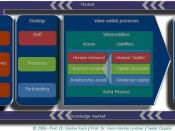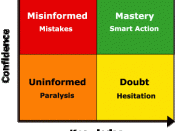What is the relationship between organizational learning and organizational knowledge and the affect of knowledge management on organizational learning and organizational knowledge? This important question has been explored in several different fields within cognitive science. In mathematics education, the relationship between learning and understanding has been examined in order to better understand children's tendencies to learn algorithms by rote without developing any understanding of what they are doing. In developmental psychology, articulating how procedures and concepts interact is critical to anunderstanding of how development occurs (Rittle-Johnson & Siegler, 1998). In cognitive psychology, both the learning of concepts (Medin, 1989) and the acquisition of procedural skill (Anderson, 1982) are well-studied, but therelationship between them after successful acquisition is not. In philosophy, the question of the relationship between knowing and doing has a very rich past (Ryle, 1949).
In this theoretical paper, I draw from research in each of these approaches. I examine how knowledge of procedures and concepts has been studied and what conclusions have been reached about the relationship between them.
From the collected evidence, it appears that little useful theory has been developed to explain how organizational knowledge and organizational learning are related. I then postulate reasons for this deficiency and suggest alternative ways in which this topic can be conceptualized and studied.
Some of this knowledge can be termed technical - knowing the meaning of technical words and phrases, being able to read and make sense of economic data and being able to act on the basis of law-like generalizations. Scientific knowledge is 'propositional'; it takes the form of causal generalizations - whenever A, then B. For example, whenever water reaches the temperature of 100 degrees, it boils; whenever it boils, it turns into steam; steam generates pressure when in an enclosed space; pressure drives engines. And so...


